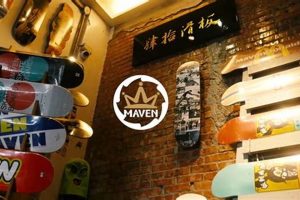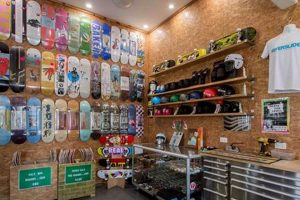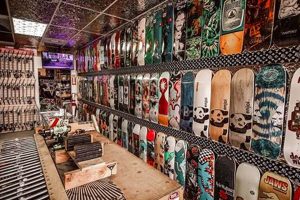This establishment, often a local business, specializes in the sale of skateboarding equipment and apparel. It typically stocks items such as skateboards, wheels, trucks, bearings, shoes, and protective gear like helmets and pads. The enterprise might also offer services like skateboard repair and customization. These entities often foster a sense of community by hosting events, sponsoring local skaters, and providing a gathering place for enthusiasts.
The significance of such a venture lies in its potential for rehabilitation and community contribution. It provides an opportunity for individuals with a criminal history to engage in productive entrepreneurship, offering a path toward self-sufficiency and a positive re-entry into society. Furthermore, it can act as a symbol of redemption and the power of second chances, inspiring others and challenging societal stigmas. The historical context often reflects a desire to support marginalized individuals and create inclusive spaces within the skateboarding subculture.
Subsequent discussions will delve into the business’ operational structure, community impact, and the specific challenges and opportunities faced by its founders. Further examination will explore the nuances of reintegration into society through entrepreneurship within the context of the skateboarding industry.
Skateboarding Guidance
The following guidance is intended to enhance skateboarding performance and safety, catering to various skill levels. These principles are applicable across different terrains and skateboarding styles.
Tip 1: Prioritize Safety Equipment. Consistent use of a certified helmet is paramount. Knee and elbow pads are strongly advised, particularly for beginners and when attempting new maneuvers. Wrist guards can mitigate the risk of fractures from falls.
Tip 2: Master Fundamental Skills. Before attempting advanced tricks, ensure proficiency in basic skills such as pushing, balancing, turning, and stopping. Solid fundamentals provide the foundation for progression.
Tip 3: Select Appropriate Skateboarding Equipment. The skateboard should be tailored to the rider’s size, weight, and intended use. Consider deck size, wheel hardness, and truck responsiveness when making equipment choices.
Tip 4: Choose Safe Skateboarding Locations. Avoid skateboarding in high-traffic areas or locations with obstacles that could pose a hazard. Skate parks and designated skateboarding areas provide controlled environments.
Tip 5: Practice Regularly. Consistent practice is crucial for improving skateboarding skills. Set realistic goals and gradually increase the difficulty of tricks and maneuvers as proficiency develops.
Tip 6: Maintain Skateboarding Equipment. Regularly inspect the skateboard for wear and tear. Tighten loose hardware, clean bearings, and replace worn-out parts to ensure optimal performance and safety.
Tip 7: Learn from Experienced Skateboarders. Observing and learning from experienced skateboarders can provide valuable insights and guidance. Seek advice from mentors or join a skateboarding community.
This guidance emphasizes the importance of preparation, safety, and continuous improvement in skateboarding. By adhering to these principles, individuals can maximize their enjoyment and minimize the risk of injury.
The subsequent sections will address more specific aspects of skateboarding, including trick tutorials and equipment reviews.
1. Community Reintegration
Community reintegration represents a critical component of the operational and philosophical framework of this venture. Its essence lies in providing individuals with a criminal history a pathway back into society through meaningful employment and entrepreneurship. The endeavor directly confronts the challenges faced by ex-offenders, who often encounter significant barriers to securing employment and housing, leading to increased rates of recidivism. The business endeavors to disrupt this cycle by offering not only jobs but also an opportunity for skill development and financial independence. The effect of this initiative is twofold: it diminishes the likelihood of re-offending and contributes positively to the local economy.
The importance of community reintegration within the context of a retail setting is substantial. The business offers a supportive work environment where individuals can rebuild their confidence and develop positive relationships with colleagues and customers. Furthermore, it demonstrates to the wider community that rehabilitation is possible and that ex-offenders can become productive members of society. Some similar programs focus on vocational training within the retail sector, such as offering retail skills certifications and job placement assistance. These initiatives underscore the potential for this model to be replicated and scaled to address the broader societal issue of ex-offender reintegration.
In conclusion, the symbiotic relationship between the business and community reintegration represents a proactive and innovative approach to addressing the complex challenges faced by individuals re-entering society after incarceration. It challenges existing stigmas and highlights the potential for entrepreneurship to serve as a vehicle for personal and societal transformation. The sustained success hinges upon continuous community support, effective mentorship programs, and a commitment to providing ongoing opportunities for growth and development within the organization.
2. Entrepreneurial Opportunity
The establishment leverages entrepreneurial opportunity as a cornerstone of its business model, recognizing the transformative potential of self-directed enterprise for individuals with criminal histories. The enterprise serves as a practical platform for developing and exercising business acumen, encompassing areas such as inventory management, customer service, financial planning, and marketing. The establishment offers a tangible means for individuals to acquire marketable skills and build a sustainable livelihood, mitigating the systemic barriers to employment they often face. Examples of similar rehabilitative enterprises include bakeries, construction companies, and landscaping businesses that actively recruit and train ex-offenders.
The significance of entrepreneurial opportunity extends beyond mere employment; it fosters a sense of ownership, responsibility, and self-worth. Individuals are empowered to contribute to the success of the business, develop innovative solutions, and cultivate a positive professional identity. The financial literacy and business management skills acquired through the enterprise enhance their ability to manage personal finances, invest in their future, and contribute to their local economies. The positive impact further extends to the community, with initiatives potentially funding local skateboarding programs.
In conclusion, the nexus between this business and entrepreneurial opportunity underscores the potential for social enterprise to drive positive change. By providing access to business ownership and skill development, the establishment offers a pathway for individuals to rebuild their lives, contribute to their communities, and challenge the prevailing stigma associated with criminal histories. Future success relies on continued community support, access to capital, and a commitment to fostering a culture of innovation and empowerment.
3. Skateboarding Culture
The subculture of skateboarding profoundly influences the ethos and operation of such business ventures. It extends beyond mere recreation, encompassing a distinct set of values, aesthetics, and social dynamics that shape its participants’ identities and interactions.
- DIY Ethos and Independence
Skateboarding culture emphasizes self-reliance and a do-it-yourself approach. This translates into the skate shop’s potential for customization, repair services, and a non-conformist attitude, reflecting a rejection of mainstream consumerism and a focus on individual expression. The shop becomes more than a retail outlet; it becomes a hub for creativity and self-sufficiency.
- Community and Inclusivity
Despite its individualistic elements, skateboarding fosters a strong sense of community. Skate parks and local shops serve as gathering places for skaters of all skill levels and backgrounds. In this context, the shop can provide a safe and inclusive space for individuals who may have faced marginalization, aligning with the rehabilitative goals of the enterprise.
- Resilience and Perseverance
Skateboarding inherently involves overcoming challenges and enduring setbacks. The process of learning tricks cultivates resilience and perseverance. This resonates with the founders’ and employees’ personal journeys of overcoming adversity, fostering a shared sense of determination and a rejection of failure.
- Countercultural Identity
Skateboarding has historically been associated with countercultural movements and a rejection of societal norms. The shop can embrace this identity through its product selection, marketing strategies, and community involvement, appealing to skaters who value authenticity and individuality, and challenging pre-conceived notions.
These facets of skateboarding culture are integral to the brand identity and operational strategy of the shop. By embracing these values, it can establish itself as a legitimate and respected member of the skateboarding community, fostering loyalty and generating positive social impact. The success of the enterprise is intrinsically linked to its ability to authentically embody the spirit of skateboarding.
4. Overcoming Stigma
The existence of a skate shop with the specified name directly confronts the societal stigma associated with felony convictions. Individuals with such records frequently encounter prejudice in employment, housing, and social interactions, hindering their reintegration into mainstream society. The establishment, by its very name, acknowledges the past while simultaneously asserting a commitment to a productive future. This transparency serves as a challenge to preconceived notions and an invitation for community members to reassess their biases.
The active operation of this business, particularly if successful, provides tangible evidence that rehabilitation is possible and that past mistakes do not necessarily define an individual’s future potential. The shop could engage in public education campaigns, sharing the stories of its founders and employees to humanize the issue and dispel common stereotypes. Furthermore, the enterprise may partner with local organizations that provide support services to formerly incarcerated individuals, amplifying the impact of its message and creating a network of support. The Dave’s Killer Bread Foundation, for instance, supports second-chance employment, offering resources and advocacy to businesses that hire individuals with criminal backgrounds.
Ultimately, the skate shop’s success in overcoming stigma depends on its ability to deliver quality products and services while simultaneously demonstrating a commitment to its mission. By fostering a positive and inclusive environment, both for its employees and its customers, the establishment can contribute to a broader shift in societal attitudes towards formerly incarcerated individuals. The challenge lies in consistently maintaining transparency, accountability, and a unwavering dedication to the principles of rehabilitation and community empowerment.
5. Redemption Narrative
The concept of a “redemption narrative” serves as a central theme in the context of the specified business. It provides a framework for understanding how individuals with criminal histories can reclaim their lives, contribute positively to society, and reshape public perception. This narrative, embedded within the business model, aims to transform personal experiences of past transgressions into a compelling story of growth, resilience, and social contribution.
- Reclaiming Personal Identity
The redemption narrative offers a mechanism for individuals to redefine their self-image, moving beyond the label of “felon” to embrace new identities as entrepreneurs, skilled workers, and community members. This process involves actively constructing a new story that emphasizes personal growth, accountability for past actions, and a commitment to positive change. For instance, the founders may participate in public speaking engagements, sharing their experiences and insights with youth groups or community organizations. This active engagement helps to reframe their public image and inspire others facing similar challenges.
- Transforming Societal Perceptions
A compelling redemption narrative has the potential to challenge prevailing stereotypes and biases towards individuals with criminal records. By showcasing the successes and contributions of the business, the founders can demonstrate that rehabilitation is possible and that past mistakes do not preclude future achievement. The shop’s name, while provocative, serves as a constant reminder of this narrative, prompting reflection and potentially altering perceptions. Success stories of formerly incarcerated individuals who have successfully turned their lives around, like those highlighted by organizations such as Defy Ventures, exemplify the transformative power of this approach.
- Building Trust and Credibility
Transparency and authenticity are crucial elements of a credible redemption narrative. The business must be willing to acknowledge past mistakes, demonstrate accountability, and communicate its commitment to ethical practices. This can be achieved through open dialogue with the community, transparent financial reporting, and active involvement in local initiatives. Building trust is essential for attracting customers, partners, and investors who believe in the shop’s mission and are willing to support its success.
- Inspiring Others and Fostering Hope
A powerful redemption narrative can serve as a source of inspiration for others who have faced adversity or are struggling to overcome their past mistakes. By sharing their stories and providing opportunities for employment and mentorship, the founders can create a ripple effect of positive change within their community. The shop can become a symbol of hope, demonstrating that second chances are possible and that individuals can overcome even the most challenging circumstances. Examples of similar initiatives that have successfully inspired hope and fostered positive change include organizations that provide educational opportunities to incarcerated individuals and those that offer job training programs to ex-offenders.
These interconnected elements underscore the profound impact of a redemption narrative on the specified business. By actively constructing and communicating a compelling story of transformation, the founders can not only rebuild their own lives but also contribute to a more just and equitable society. The success of the skate shop ultimately hinges on its ability to authentically embody this narrative, inspiring trust, fostering hope, and challenging the prevailing stigma associated with criminal convictions. The story itself becomes a valuable product, more powerful than any skateboard or wheel.
Frequently Asked Questions
The following questions address common inquiries regarding the establishment. These responses aim to provide clarity and understanding of its operational model and mission.
Question 1: What is the underlying purpose of this business?
The primary objective extends beyond mere retail. The enterprise serves as a vehicle for community reintegration, offering entrepreneurial opportunities to individuals with felony convictions. This business model promotes rehabilitation and challenges societal stigmas.
Question 2: How are potential employees vetted and trained?
The selection process prioritizes individuals demonstrating a commitment to positive change and a willingness to acquire new skills. Training programs focus on developing proficiency in retail operations, customer service, and financial literacy. Mentorship is integrated to foster professional growth and personal development.
Question 3: Does the history of the owners or employees affect the quality of the products sold?
Product quality remains a paramount concern. The shop sources merchandise from reputable suppliers and adheres to rigorous quality control standards. Past histories do not compromise the integrity of the goods offered.
Question 4: How is the business structured to ensure ethical operations?
Transparency and accountability are integral to the business structure. Financial records are meticulously maintained and subject to independent audits. A clear code of conduct governs employee behavior, promoting ethical decision-making at all levels of the organization.
Question 5: What impact does this business have on the local community?
The enterprise strives to be a positive force within the community. In addition to providing employment opportunities, the shop may support local skateboarding initiatives and community development programs. The goal is to contribute to the well-being and economic vitality of the area.
Question 6: How can individuals support this business and its mission?
Support can be demonstrated through patronage, advocacy, and volunteerism. Purchasing products from the shop directly contributes to its sustainability. Raising awareness of its mission and advocating for second-chance employment opportunities are also valuable contributions. Volunteer opportunities may be available to assist with various aspects of the business operation.
These answers are intended to provide a concise overview of frequently asked questions. Further inquiries can be directed to the appropriate channels.
The subsequent section will address the long-term vision and strategic goals.
Concluding Remarks
This exploration has dissected the core tenets of “two felons skate shop,” detailing its operational foundations and its potential impact on both individuals and the community. The business model, designed to offer entrepreneurial avenues for those with prior felony convictions, confronts societal stigmas and provides a structured pathway toward personal and economic rehabilitation.
The enterprise’s success hinges on a commitment to transparency, ethical operations, and the delivery of quality products and services. Its long-term viability requires ongoing community support and a sustained dedication to its mission of empowerment and positive social change. The venture serves as a test case for alternative economic models and a challenge to conventional notions of opportunity and redemption. Continued analysis and observation of its trajectory are warranted.







